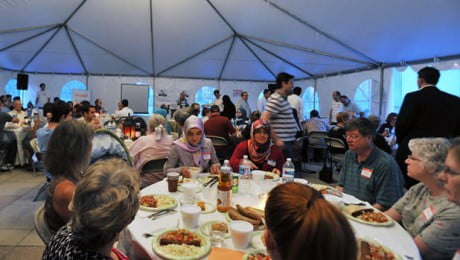Keyword: Dialogue

Yes, Religion Can Still Be A Force For Good In The World
Founded by a group of Turkish-American businessmen and educators to honor the vision of their spiritual leader, Muslim scholar Fethullah Gulen, the Niagara Foundation organizes conferences, lectures, retreats and more to promote interfaith dialogue and awareness.

CCBT Teaches Turkish in Public School in Rio de Janeiro
The Turkish-Brazilian Cultural Center (CCBT) has been teaching Turkish classes at the State School Infante Don Henrique in the Copacabana neighborhood, Rio de Janeiro, since July 2013. This course has been attracting attention of educators, tourism professionals, journalists and governors from other Brazilian States.

Tamsil: The inadvertent overspill of internalization
Gülen says, “Where you are [your ego], He is not; where you are not [your ego], He is.” In the Naqshibandi Sufi order there are four steps to reaching spiritual enlightenment “forget [forsake] the world, forget the [rewards of] the afterlife, forget your ego, forget [all these acts of] forgetting,” lest being conscious of them risks making one proud. So forgetting, or in the case of tamsil, not being aware of or intending to show or guide from the outset is key.

Joint mosque-cemevi project launched in Tokat
Turkey’s first-ever joint mosque-cemevi complex has been under construction in Ankara since last September. The project, which is being carried out by the CEM Foundation and the Hacı Bektaş Veli Culture, Education, Health and Research Foundation, was first suggested by Turkish-Islamic scholar Fethullah Gülen, who lives in the US in self-imposed exile.

“Hizmet Movement making tremendous contributions to Muslim culture”
The Hizmet Movement, as an organization, with Fethullah Gulen’s inspiration for the movement, is a bright light for the Muslim-American community because of the focus of the organization in doing community service through relief work, and in focusing on education, in scientific education in particular, and also, with regards to interfaith and intercultural exchange.

Understanding of Muslims in US is limited, says scholar
“Part of what we are doing involves interfaith work,” says Turk, and he brings up the role of the Pacifica Institute in California that does similar work in accordance with the teachings of Islamic scholar Fethullah Gülen. “The same values are taught by Gülen,” Turk says, and adds that students from the Gülen-inspired Hizmet movement attend Bayan Claremont as well. “We are educating the next generation of Islamic scholars and community leaders,” Turk says.

Mothers meet in İstanbul to mark Mother’s Day, see their children
A mother, Vera Stamova from Moldova, expressed similar feelings. “My two children study in Turkey. My younger daughter studied in Turkish schools [in Moldova]. She received a quality education. I love Turkey and I have great confidence in Turkish people. If I had another child, I would also send her to Turkey. I miss them a lot, but they are very lucky and are taken good care of here,” she said.

Fethullah Gulen’s Dialogue
In the contextual theology of Gulen, faith is always translated into action in light of the pressing needs of a given society. Islam, thus, becomes a language to speak about human needs and concerns as much as the content of these beliefs are shaped and understood by the prevailing context.

Dialogue advocacy group ‘disturbed’ by Erdoğan’s harassment of Hizmet
NEW YORK The Alliance for Shared Values (AFSV), an advocacy body that serves as a voice for organizations affiliated with the Hizmet movement in the US, has said it is “deeply disturbed” by what it called Turkish Prime Minister Recep Tayyip Erdoğan’s “politically motivated attempts” to crack down on law-abiding citizens.The group was protesting Erdoğan’s […]

Call for Papers – International Conference on “Indo-Turkish Dialogue: Historical, Social and Cultural Perspectives”
The two-day International Conference on “Indo-Turkish Dialogue: Historical, Social and Cultural Perspectives” is jointly organized by the Centre for Study of Foreign Languages, University of Hyderabad, India, Mevlana University, Turkey and Indialogue Foundation, India in October, 2014 in University of Hyderabad, India.

Turkish Day proclamation, celebration planned at Syracuse City Hall
The first Turkish Day in Syracuse will be celebrated at City Hall from noon to 1 p.m. today. Mayor Stephanie Miner will read a proclamation followed by the raising of the flags of the United States and Turkey. The Turkish national anthem will be played. Afterward, folk dances will be performed and Turkish cuisine will be served. Weather permitting, the festivities will be held on the front steps of City Hall, 223 E. Washington St.





















